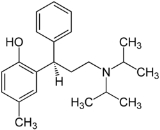
Tolterodine
Encyclopedia
Tolterodine is an antimuscarinic drug that is used to treat urinary incontinence
.
It is marketed by Pfizer
in Canada and the United States by its brand name Detrol. In Egypt it is also found under the trade names Tolterodine by Sabaa and Incont L.A. by Adwia.
.
Tolterodine, although it acts on all types of receptors, has fewer side effects than oxybutynin
(M3 and M1 selective, but more so in the parotid than in the bladder) as tolterodine targets the bladder more than other areas of the body. This means that less drug needs to be given daily (due to efficient targeting of the bladder) and so there are fewer side effects.
The following reactions have been reported in patients who have taken tolterodine since it has become available:
Contraindications:
Not to be used in patients with myasthenia gravis
and angle closure glaucoma.
Urinary incontinence
Urinary incontinence is any involuntary leakage of urine. It is a common and distressing problem, which may have a profound impact on quality of life. Urinary incontinence almost always results from an underlying treatable medical condition but is under-reported to medical practitioners...
.
It is marketed by Pfizer
Pfizer
Pfizer, Inc. is an American multinational pharmaceutical corporation. The company is based in New York City, New York with its research headquarters in Groton, Connecticut, United States...
in Canada and the United States by its brand name Detrol. In Egypt it is also found under the trade names Tolterodine by Sabaa and Incont L.A. by Adwia.
Use
Detrusor overactivity (DO, contraction of the muscular bladder wall) is the most common form of UI in older adults. It is characterized by uninhibited bladder contractions causing an uncontrollable urge to void. Urinary frequency, urge incontinence and nocturnal incontinence occur. Abnormal bladder contractions that coincide with the urge to void can be measured by urodynamic studies. Treatment is bladder retraining or with drugs that inhibit bladder contractions such as oxybutinin and tolterodine.Pharmacology
Tolterodine acts on M1, M2, M3, M4 and M5 subtypes of muscarinic receptors whereas modern antimuscarinic treatments for overactive bladder only act on M3 receptors making them more selective. It is marketed and manufactured by PfizerPfizer
Pfizer, Inc. is an American multinational pharmaceutical corporation. The company is based in New York City, New York with its research headquarters in Groton, Connecticut, United States...
.
Tolterodine, although it acts on all types of receptors, has fewer side effects than oxybutynin
Oxybutynin
Oxybutynin is an anticholinergic medication used to relieve urinary and bladder difficulties, including frequent urination and inability to control urination , by decreasing muscle spasms of the bladder. It competitively antagonizes the M1, M2, and M3 subtypes of the muscarinic acetylcholine...
(M3 and M1 selective, but more so in the parotid than in the bladder) as tolterodine targets the bladder more than other areas of the body. This means that less drug needs to be given daily (due to efficient targeting of the bladder) and so there are fewer side effects.
Side effects
Known side effects:- XerostomiaXerostomiaXerostomia is the medical term for the subjective complaint of dry mouth due to a lack of saliva. Xerostomia is sometimes colloquially called pasties, cottonmouth, drooth, or doughmouth. Several diseases, treatments, and medications can cause xerostomia. It can also be exacerbated by smoking or...
(dry mouth) - Decreased gastric motility (upset stomach)
- HeadacheHeadacheA headache or cephalalgia is pain anywhere in the region of the head or neck. It can be a symptom of a number of different conditions of the head and neck. The brain tissue itself is not sensitive to pain because it lacks pain receptors. Rather, the pain is caused by disturbance of the...
- ConstipationConstipationConstipation refers to bowel movements that are infrequent or hard to pass. Constipation is a common cause of painful defecation...
- Dry eyes
- Sleepiness
The following reactions have been reported in patients who have taken tolterodine since it has become available:
- Allergic reactions including swelling
- Rapid heartbeat or abnormal heartbeat
- Accumulation of fluid in the arms and legs
- Hallucinations
Contraindications:
Not to be used in patients with myasthenia gravis
Myasthenia gravis
Myasthenia gravis is an autoimmune neuromuscular disease leading to fluctuating muscle weakness and fatiguability...
and angle closure glaucoma.
Marketing
New York Times reporter Melody Petersen, who wrote the book Our Daily Meds: How the Pharmaceutical Companies Transformed Themselves into Slick Marketing Machines and Hooked the Nation on Prescription Drugs (Farrar, Straus and Giroux, 2008), said that "the most outrageous thing" she saw covering the pharmaceutical industry was a PowerPoint presentaton on "Creating a Disease," which created a disease called "overactive bladder" for the purpose of marketing Detrol. Doctors try to manage incontinence in non-pharmaceutical ways, she said. Detrol became a blockbuster, said Petersen, despite the adverse effect of severe memory problems.External links
- Detrol - FDA factsheet
- Tolterodine
- Tolterodine (patient information)

